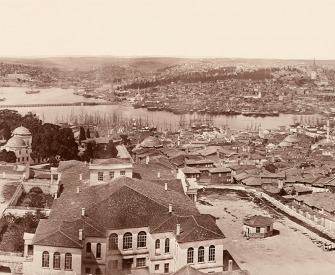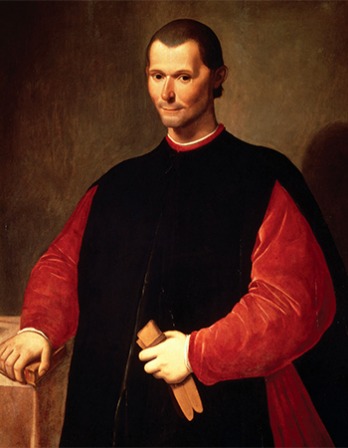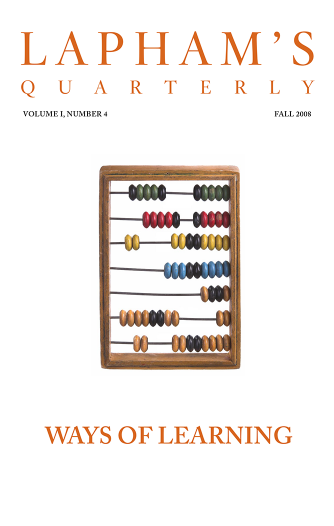The screech and mechanical uproar of the big city turns the citified heads, fills citified ears—as the song of birds, wind in the trees, animal cries, or as the voices and songs of his loved ones once filled his heart. He is sidewalk happy.
—Frank Lloyd Wright, 1958Dickens in Lagos
In Nigeria, modernity hasn’t yet begun to solve the problems of people thrown together in the urban cauldron.
By George Packer
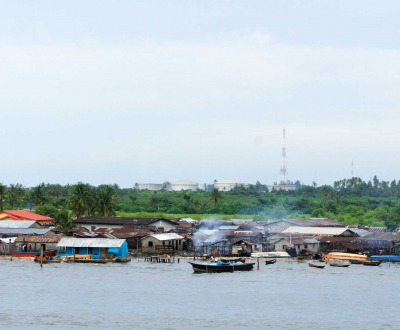
Lagos River, Nigeria. Image via Shutterstock.
Two years ago in Rangoon, I met a toothpick-thin, boisterous young Burmese man called Somerset. He had conferred this nickname on himself at age sixteen, after renting a collection of stories by W. Somerset Maugham from one of the bookstalls on Pansodan Road. By memorizing sentences from the collection, Somerset taught himself a somewhat formal and archaic English. Then he moved on to Dickens. His identification with the works of these long-dead British writers was total. “All of those characters are me,” Somerset explained. “Neither a British nor American young man living in the twenty-first century can understand a Dickens as well as I can. I am living in a Dickens atmosphere. Our country is at least one or two centuries behind the Western world. My neighborhood—bleak, poor, with small domestic industries, children playing on the street, the parents are fighting with each other, some are with great debt, everyone is dirty. That is Dickens. In that Dickens atmosphere I grew up. I am more equipped to understand Dickens than modern novels. I don’t know what is air conditioning, what is subway, what is fingerprint exam.”
Somerset helped make sense of an impression that had been hovering in my mind, just beyond articulation, for many years during travels through countries in Africa and Asia that are a century or two behind the Western world. Talking with an itinerant used-clothing peddler in eastern Uganda, or a Nigerian girl newly arrived in Lagos who had to prostitute herself to work off a debt, or an educated Iraqi who made his living selling cigarettes and secondhand books, I would experience a sense of déjà vu that took me entirely out of my own life and time. It felt as if I were meeting a character from one of the great novels of the late nineteenth century—Our Mutual Friend, Sister Carrie, or something by George Gissing or Thomas Hardy. Reading Jude the Obscure on a trip through Kenya, I began to see its hero’s frustrated aspirations in every young person with a worthless high-school diploma, a menial job, and a tattered paperback copy of a self-improvement guide. Jude is far more alive today in Mombasa than in Wessex.
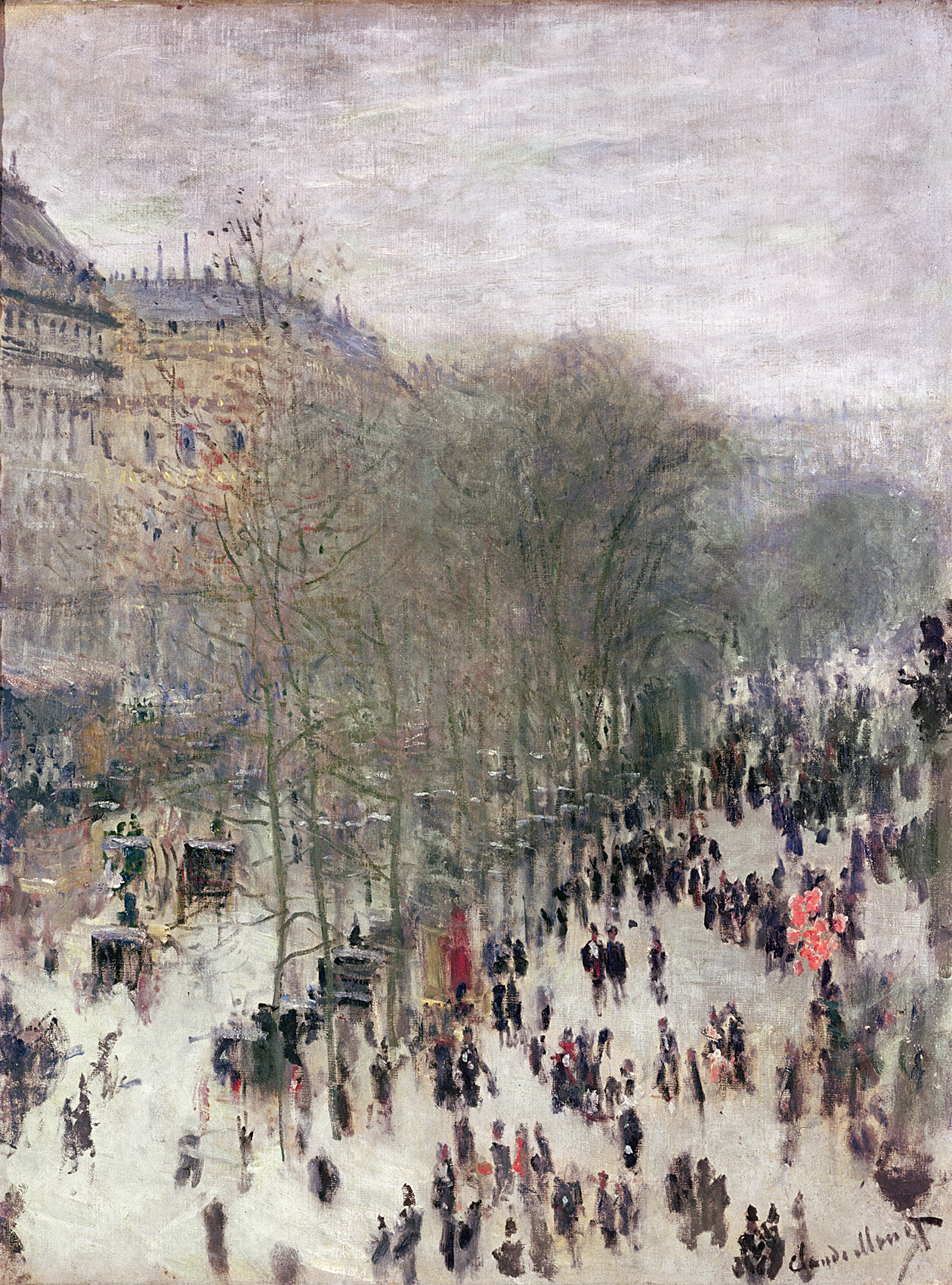
Boulevard des Capucines, by Claude Monet, c. 1873. Nelson-Atkins Museum of Art, Kansas City, Missouri.
The concerns of that literature—the individual caught in an encompassing social web, the sensitive young mind trapped inside an indifferent world, the beguiling journey from countryside to metropolis, the dismal inventiveness with which people survive, the permanent gap between imagination and opportunity, the big families whose problems are lived out in the street, the tragic pregnancies, the ubiquity of corruption, the earnest efforts at self-education, the preciousness of books, the squalid factories and debtor’s prisons, the valuable garbage, the complex rules of patronage and extortion, the sudden turns of fortune, the sidewalk con men and legless beggars, the slum as theater of the grotesque: long after these things dropped out of Western literature, they became the stuff of ordinary life elsewhere, in places where modernity is arriving but hasn’t begun to solve the problems of people thrown together in the urban cauldron.
The special power of the late-nineteenth-century novel comes from the proximity of acute sentience and overwhelming circumstance. Its moral atmosphere depends on characters whose awareness and ambition are too large for the social order (described with relentless detail) into which fate has thrown them. They are painfully conscious of the contours of their society, the dominance of money, the price of transgression, the place on the scale of rank and clout of everyone they encounter. Life is an endless battle for survival, and happiness is not the lot of the sensitive. They feel too much, want too much, and are ultimately driven into a state of hopeless revolt or else bitter surrender. This situation affords an emotional register of yearning and pathos that is almost absent from modern fiction, and has never been dominant among American novelists, who, with exceptions like
Theodore Dreiser and later Richard Wright, have been drawn to the free individual more than the social victim. When Tom Wolfe tried to resurrect the social novel in the 1980s and 1990s, he was laboring under two handicaps that sabotaged his project: his own limits as a novelist and the fact that, a hundred years late, the effort was bound to suffer from self-consciousness and inauthenticity.
With Dickens, the sheer energy of invention (as well as the irresistible temptation of sentimentality) lightens up the darker implications of his vision. By contrast, a writer like Gissing, a late Victorian who was not blessed with Dickens’ dazzling imagination and bravura style but made up for it in hard-won sensitivity to the daily humiliations of London life, produced, in the course of a short life, novel after novel about men and women whose aspirations always end in suffering and sordid compromise. His eye for the petty details of thwarted lives was flawless. In New Grub Street, about the literary life, Edwin Reardon, an idealistic novelist with a practical-minded, money-conscious wife, is afflicted with a terminal case of writer’s block and ends up losing both his marriage and his trade. When the couple make an effort at reconciliation, the writer is too poor to take the bus to his mother-in-law’s house; instead, he walks miles in a downpour without an overcoat (his has grown threadbare), and shows up in such shabby clothing that his wife, noticing his “muddy and shapeless boots,” can’t look him in the eye. “Both had come to this meeting prepared for a renewal of amity, but in these first few moments, each was so disagreeably impressed by the look and language of the other that a revulsion of feeling undid all the more hopeful effects of their long severance.” In the end, as the novelist lies dying in a coastal town, his best friend Harold Biffen (another struggling writer) takes a break from the deathwatch to walk along the beach. “The drives and promenades were thronged with people in exuberant health and spirits. Biffen regarded this spectacle with resentful scorn; at another time it would have moved him merely to mirth, but not even the sound of the breakers when he had wandered as far as possible from human contact could help him to think with resignation of the injustice which triumphs so flagrantly in the destinies of men.”
The conditions for Gissing’s version of unhappiness, and Hardy’s, and Dreiser’s (and, earlier, Balzac’s), no longer exist in the civilizations that produced their work. In the great cities of the West, the standard of living is too high, public life too rationalized, social taxonomy too fluid, and aesthetic taste too jaundiced, for a novel to turn on the main character’s frayed overcoat and muddy boots. Modernity and the welfare state did away with the naked sympathies and tragic destinies of the late-nineteenth-century novel. For this reason, in a country like Burma, which has experienced neither modernity nor the welfare state, an intense young reader is better equipped to enter the world of Dickens than anyone in Los Angeles or New York, and knows it. Also for this reason, Dickens’ real heirs are less likely to have grown up in London than Bombay. It’s no accident that one of the few great works of social realism of recent years was produced by an Indian-born writer, Rohinton Mistry, whose novel A Fine Balance begins with this epigraph from Balzac: “Holding this book in your hand, sinking back in your soft armchair, you will say to yourself: perhaps it will amuse me. And after you have read this story of great misfortunes, you will no doubt dine well, blaming the author for your own insensitivity, accusing him of wild exaggeration and flights of fancy. But rest assured: this tragedy is not a fiction. All is true.”
All is true. In vast, impoverished cities like Bombay, Cairo, Jakarta, Rio, or Lagos, the plot lines of the nineteenth century proliferate. Not ignorant mass suffering, but the ordeal of sentient individuals who are daily exposed to a world of possibilities through a sheet of glass—satellite TV, the Internet—that keeps them out. The extreme conditions of megacity slums contain the extravagant material that animated Dickens. In the gap between what their inhabitants know and feel and what they can have lies all the poignancy of Hardy.
A few years ago, I spent two weeks in Lagos, where sixteen million people live (by 2015 it is projected to be the third-largest city in the world). I was looking at its slums, which turned out to coincide with the city itself. Even in the few wealthy enclaves, children hawked cell phones and cigarettes in traffic, unlicensed motorcycle taxis filled the streets, and illegal hovels sprouted like mushrooms between the walled houses. The whole city is a slum, and also a market, and seen from the air (a vantage point that the Dutch architect Rem Koolhaas sought for a project on postmodern urbanization), its undifferentiated human swarms seem to move with the blind logic of insect colonies. At street level the city feels like sheer, threatening chaos. In fact a complex, informal, but quite rigid hierarchy controls life in Lagos, one that a reader of Oliver Twist would immediately recognize.
In the relentless daily commercial hustle, everyone has an economic place in a system based on patronage: the person above you (your oga, or master) provides a subsistence living and protection of sorts, for which you owe him a pledge of loyalty and a cut of your earnings. For example, the boys who scavenge the gutters and streets for pieces of discarded plastic sell their haul to their oga, who in turn sells it to a plastics grinder. Lagos attracts the ambitious and desperate young from all over West Africa, 6,000 of them a day. They are drawn by stories of quick wealth, spread by immigrants who return home over the holidays flashing new clothes and gifts. When a newcomer arrives in the city, he’s initially dependent on an oga for a place to sleep and a meal or two. The charity lasts around twenty-four hours, then the new arrival is on his own and has to start paying back his oga for the kindness. Illusions quickly die, and he soon realizes what a young man who was cutting hardwood boards in a sawmill told me: “Nobody will care for you, and you have to struggle to survive.” But there is a great deal of latitude for entrepreneurship of a desperate kind (in a wholesale market, the poorest of the poor charge a few cents to wash the mud off the market women’s feet), which accounts for the spirit of striving that prevails in Lagos and molds people’s faces into a hard, weary, calculating expression.

A View of the Upper Parts of the Ruins of the Baths of Diocletian, by Giovanni Battista Piranesi, 1774.
One day I met a plastics grinder named Andrew Okolie, whose dark concrete shop stood under an expressway. The storerooms overflowed to the ceilings with dirty kitchenware, milk cartons, shampoo bottles, and other scavenged plastic. Because the power in the area was out—an ordinary occurrence—his two grinders had been idle for several days, and because Okolie lacked connections, he was unable to take out a bank loan of twenty thousand dollars and buy a generator that would allow him to grind one ton a day and hire a handful of youthful employees. Sitting idle and angrily chewing a piece of gum, Okolie explained to me the corruption that controlled life in Lagos from top to bottom and kept a man like him from ever getting his head above water.
Okolie supplied ground plastic to a middle-aged recycler named Babatunde Ilufoye. Ilufoye lived in a shabby-genteel neighborhood that was quickly descending into a full-blown slum, but like most people in Lagos he managed to dress with impeccable neatness, and he had impressive work habits. But like Okolie, he encountered nothing but obstacles: was suffering from the worldwide reputation of Nigerians for Internet scams and other cons, and he had a hard time finding customers overseas to whom he could export the ground-up fragments. Ilufoye, who had gotten into plastics recycling through a random Google search in an Internet cafe, once emailed a suspicious Pakistani importer, “Do you expect me to commit a crime at this age and be locked up? If I’m not a fool at twenty-one or thirty, how can I be a fool now?” There was a market for what Ilufoye was selling; he knew this because he had Google and email. But he didn’t have money. It occurred to me that if Ilufoye and Okolie lived elsewhere, they would have been successful businessmen.
At the bottom of the chain in the plastics-recycling business are the thousands of pickers who crawl across the city’s huge municipal dumps, waiting for garbage trucks to unload and then sifting through the muck with a piece of steel rebar in the shape of a sharpened hook. In one such dump, standing at the bottom of a cliff of compressed garbage and surrounded by the shanties of the pickers, I met a municipal worker named Aremu Hakeem, who escorted me across the site and pointed out recent improvements. He was very proud of the dump’s organization; he called it a “reference point” for the rest of the country. He told me that he had read books about landfills and regularly looked online for garbage-related sites. Then he fell silent. It felt as if he had taken a brief trip of the imagination and suddenly returned to find himself standing next to a mountain of garbage, amid the noise of the trucks and the intense labors of the pickers. “Someday I would like to come to your country and use what I have here,” Hakeem said, and he pointed at his head. “Here we are not using it very much.”
A speck of hodgepodge knowledge and hungry consciousness amid the tidal movements of Lagos refuse, Aremu Hakeem needs a social system that knows how to put his yearnings to use. Until that day comes, he needs a great novelist, one who understands him from the inside, and who can tell the world of the possibility and waste that crowd all the sordid corners of our world.
